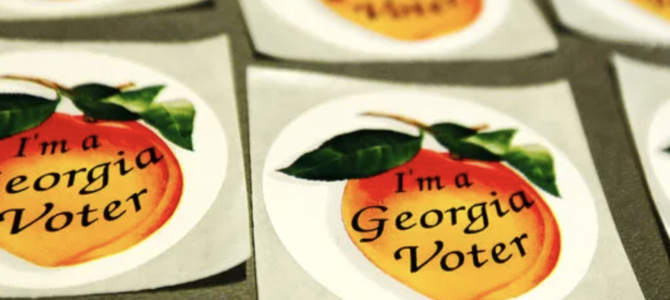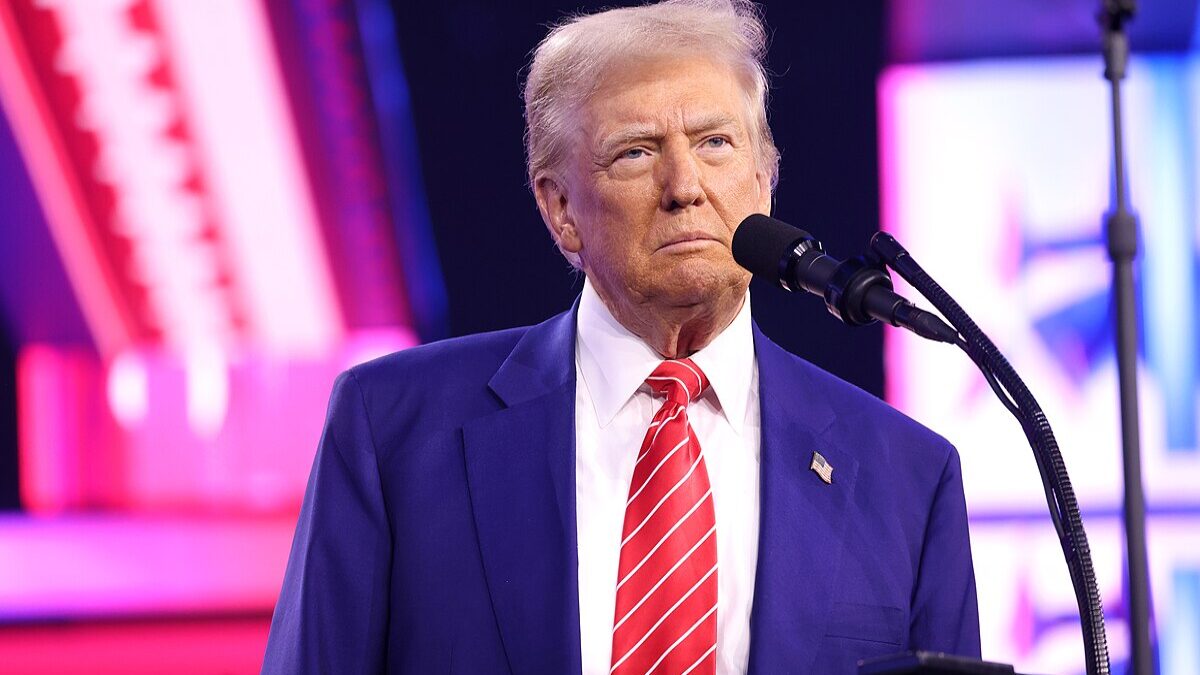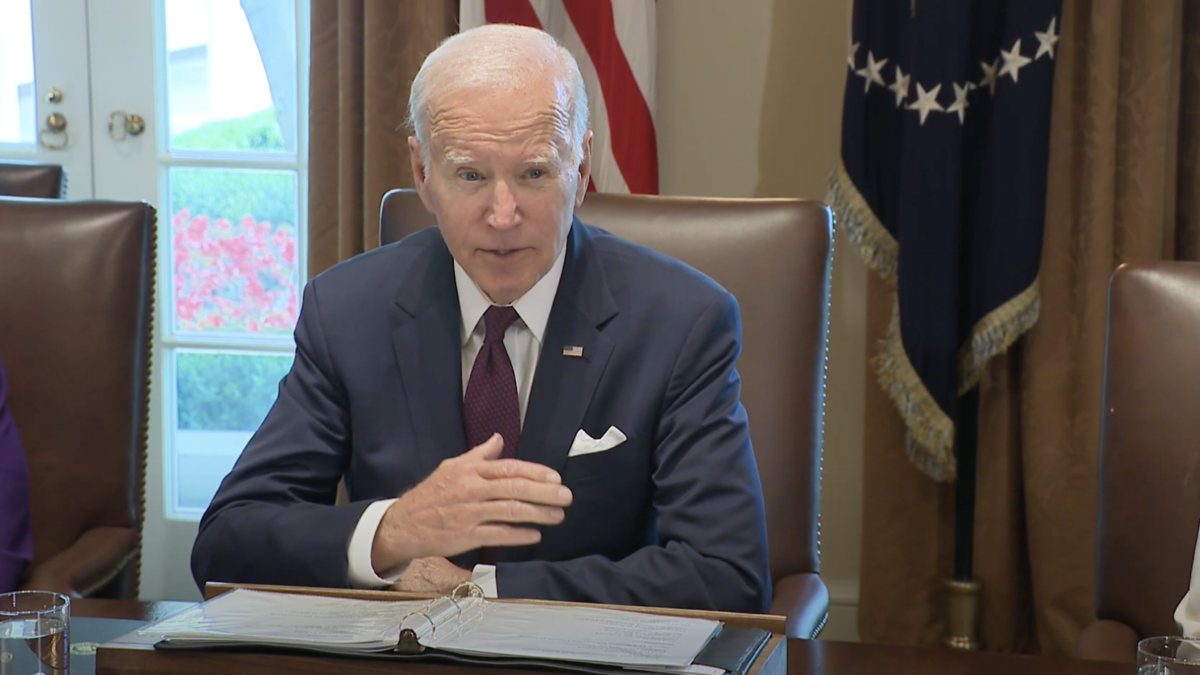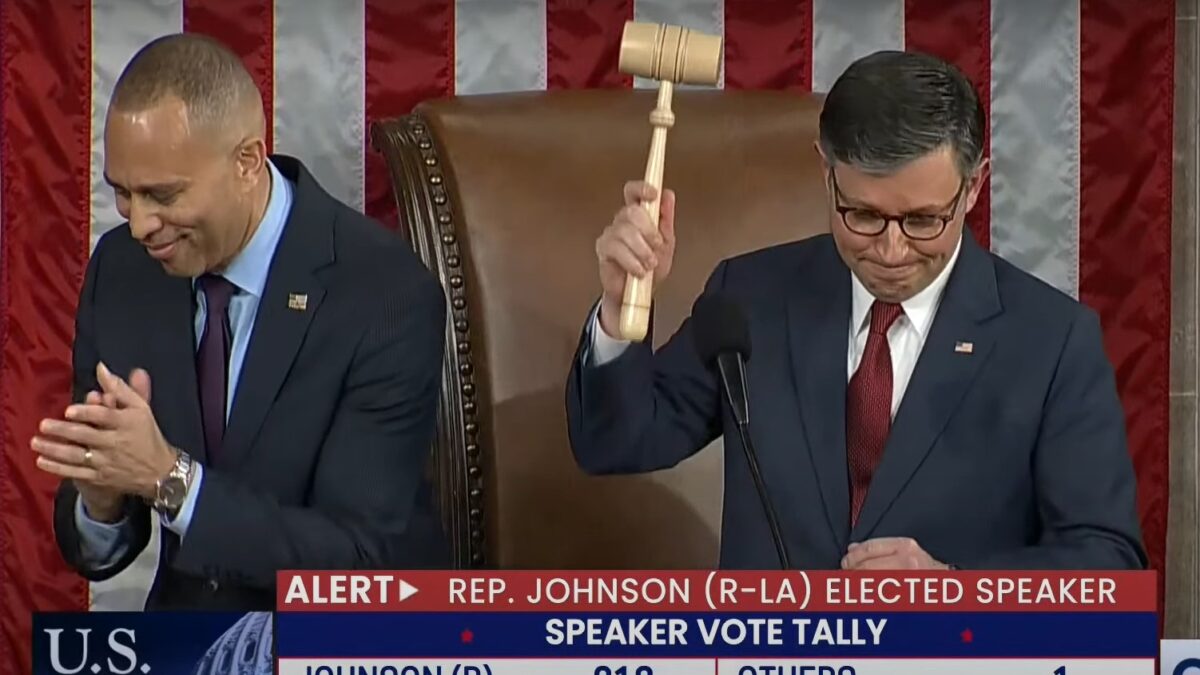
On Friday, the Biden administration filed a 46-page complaint against the state of Georgia, alleging the state’s Election Integrity Act of 2021 violated Section 2 of the Voting Rights Act. For a lawsplainer of the Voting Rights Act, read here. But for a taste of the surreal state of the U.S. Department of Justice under President Joe Biden, follow along.
1. It’s Still 1965
Given that on occasion President Joe Biden believes he’s still in the Senate, it should come as no surprise that his Department of Justice believes it’s still 1965.
In alleging that provisions in the Georgia voting-integrity law violate Section 2 of the Voting Rights Act, the DOJ opened its complaint by proclaiming that the Georgia legislature enacted the law “against the backdrop of Georgia’s history of discrimination against Black Georgians. ” The complaint continued with an entire section headed “The State of Georgia’s History of Discrimination,” which stressed, “the history of official racial discrimination against Black citizens in Georgia with regard to voting is longstanding, well-documented, and recognized by Federal courts.”
The DOJ drafted its complaint as though that reality still exists and acting oblivious to the Supreme Court’s decision in Shelby County v. Holder, even though a few paragraphs later the Biden administration noted that Georgia had been subject to the preclearance requirement of Section 5 of the Voting Rights Act until 2013, when the Supreme Court decided Shelby County.
But as the Supreme Court made clear in Shelby County, since Congress passed the Voting Rights Act in 1965 “things have changed dramatically,” and “conditions have changed significantly.” At the time the Voting Rights Act passed, “the blight of racial discrimination in voting” had “infected the electoral process in parts of our country for nearly a century.”
Accordingly, as part of the Voting Rights Act, Congress required states that had maintained tests or devices as a prerequisite to voting such as literacy and knowledge tests or good moral character requirements, “and had less than 50 percent voter registration or turnout in the 1964 Presidential election,” to obtain federal permission before enacting any law related to voting. Georgia was one of nine states subject to Section 5’s preclearance mandate.
However, after recounting the extreme circumstances that originally justified Section 5’s usurpation of state control and disparate treatment of the states, the Supreme Court concluded that “the conditions that originally justified these measures no longer characterize voting in the covered jurisdictions.”
For instance, the Supreme Court noted, by 2009, “the racial gap in voter registration and turnout [was] lower in the States originally covered by § 5 than it [was] nationwide,” and the covered states saw near parity between black and white voter turnout and registration rates. This reality led the Supreme Court in Shelby County to declare Section 5 unconstitutional, and Georgia and her sister states thus free to pass laws regulating voting without seeking federal government approval.
Yet to read the DOJ’s complaint against Georgia, one would think nothing had changed. Or maybe a more apt assessment would be that the men and women running the Biden administration’s DOJ want Americans to think nothing had changed. Well, and that the DOJ honchos don’t like the Shelby County decision and the Supreme Court stripping the power of federal bureaucrats to micromanage state election systems.
2. Georgia Republicans Are a Bunch of Racists
Relatedly, the DOJ’s complaint point-blank accuses the Georgia legislature of racism. In enacting the Election Integrity Act of 2021, “the Georgia General Assembly intended to deny or abridge the right of Black Georgians to vote on account of race or color,” the complaint opens.
Significantly, to sue under Section 2, the DOJ does not need to allege intentional racism. Rather, the federal government need only claim that the challenged “standard, practice, or procedure. . . results in a denial or abridgment of the right of any citizen of the United States to vote on account of race or color.”
While elsewhere in the complaint the government focuses on the results of the challenged provisions to claim the impact disproportionately affects black voters, the DOJ didn’t leave it there, as it could have, instead of seeing fit to brand the Georgia General Assembly as full of racists.
3. Racists Exist, Ergo, the Law Is Racist
Besides calling the Georgia legislature racist, the DOJ’s complaint wants to hold the state responsible for racists everywhere. For instance, someone created “a GIF with a slow-swinging noose aimed at [an election worker]” and later that same election worker “faced death threats,” the complaint alleges.
Horrible? Yes. Relevant in any way? No.
That didn’t stop the DOJ from including the allegation, as well as another that noted that “one phone caller threatened to behead Reverend Warnock and referred to the church at which he is a paster, Ebenezer Baptist — the church once pastored by Rev. Martin Luther King, Jr. — using a vile racial epithet.” The church, the DOJ explained, had to filter comments on its social media pages given the significant number of racist comments related to Rev. Warnock’s candidacy” for U.S. Senate.
Another allegation noted that “during the 2018 Georgia gubernatorial contest, a racist robocall referred to candidate Stacey Abrams as “Negress Stacey Abrams” and “a poor man’s Aunt Jemima.”
Again, horrible and, as the DOJ says, vile. But completely irrelevant to whether the Georgia law violates the Voting Acts Right.
4. A Complaint Is Not a Campaign Ad
The Biden administration’s peddling of random and anonymous racist comments as reflective of both the Georgia legislature and the state as a whole mirrored Democrats’ campaign strategy over the years to convince blacks not to vote for Republicans. The irrelevant allegations merely added some legalese to charges, such as Biden in 2012 that, “They’re going to put y’all back in chains.”
Several other portions of the complaint likewise sounded strikingly similar to campaign commercials touting Democratic candidates. “Vice President Kamala Harris became the first Black and Indian-American Vice President ever elected,” the complaint boosted. And “on January 5, 2021, with strong turnout among Black voters, the State of Georgia elected its first Black Senator Reverend Raphael Warnock, and its first Jewish-American Senator, Jon Ossoff,” the complaint cheered.
The most striking of the allegations came later when the DOJ claimed as a reason to believe the law was racist that “many elected officials in Georgia have not been responsive to the particularized needs of Black residents.”
5. One Thing Has Nothing to Do with the Other
Likewise irrelevant, yet included in the DOJ’s complaint, were references to Stop the Steal, and litigation about claims of voter fraud in 2020.
“Despite a dearth of evidence,” the Biden administration wrote, “accusations of fraud around the absentee voting process and the tabulation of votes circulated widely.” The complaint continued, “lawyers behind several lawsuits seeking to overturn presidential election results in multiple states hosted a press conference at a ‘Stop the Steal’ event” where calls “Georgia Governor Brian Kemp to be locked up,” were made.
The DOJ further stressed that “a barrage of lawsuits alleging voter fraud were brought.” Why, exactly, was that a problem? Here’s the DOJ’s answer: “These lawsuits often included allegations focused on counties containing significant numbers of Black voters and other voters of color.”
Similarly problematic in the DOJ’s view was that at least one Georgia senator whose committee bore responsibility for handling the voting legislation had attended a senate hearing at which unfounded claims of voter fraud were presented. What does that have to do with Section 2 of the Voting Rights Act? Nothing.
Probably the most shocking irrelevancy, however, was the DOJ’s beef that “a number of lawmakers in the Georgia Senate, who subsequently helped draft, promote, and pass SB 202, issued a statement in support of an unsuccessful lawsuit brought by the State of Texas asking the United States Supreme Court to overturn Georgia’s election results.”
Not only does this allegation have nothing to do with Section 2, the DOJ also ignored that Texas’s complaint about Georgia’s handling of the election presented a constitutional claim premised on the Electors Clause and the state’s failure to conduct the legislatively mandated signature checks and its use of dropbox voting — something the legislature had not provided for.
While the federal government might find the Electors Clause claim meritless, it isn’t exactly a good look for Department of Justice to criticize a state for seeking redress in the courts for claimed constitutional violations. And it is laughable to further suggest that the Election Integrity Act of 2021 violates Section 2 because some lawmakers involved in that legislation supported Texas’s litigation.
6. It’s a Partisan Law
Equally laughable are the DOJ’s allegations concerning the supporters of the new Georgia voting law.
“On February 17, 2021, SB 202 was introduced in the Senate with only white sponsors,” the DOJ wrote in some sort of “gotcha” moment. The DOJ then outdid itself by complaining that the Senate passed the bill “along party lines with no support from Black legislators,” and the House did the same.
They then complain Kemp signed the law “behind closed doors and before a group of supporters that did not include any people of color. When Rep. Park Cannon, who is Black, attempted to witness the signing, she was arrested.”
Is it strange that the governor would not invite a representative who called the legislation “Jim Crow 2.0” to its signing? Or that she would be arrested after officers told her to stop pounding on the governor’s door during the signing ceremony?
7. Problems, What Problems?
The Biden administration’s complaint also takes a hilarious-if-it-weren’t-so-sad spin on the legitimate concerns that drove passage of the Election Integrity Act of 2021, with the DOJ acting as if there were no problems in Georgia’s administration of the 2020 election.
The DOJ spins began early in its refusal to even acknowledge the name of Georgia’s law, the Election Integrity Act of 2021, instead, saying the bill is known as “Georgia Senate Bill 202,” and referring to the voter-integrity law as SB 202 throughout the complaint.
Then, the Biden administration ticked through the challenged provisions, which include the prohibition on the government from distributing unsolicited absentee ballot applications and the bar on private organizations from distributing duplicate absent ballot applications. The DOJ also objected to the requirement that in requesting an absentee ballot, voters without a state-issued driver’s license provide a photocopy of another form of identification, which could include a utility bill.
The lawsuit further alleged that limits on the time period for registrants to request a ballot, limiting absentee ballot drop boxes, barring out-of-precinct ballots, and banning distribution of food or drink to persons waiting in line all violated Section 2 of the Voting Rights Act.
For anyone knowledgeable about the issues that plagued Georgia and other states, the DOJ’s arguments proved guffaw-inducing. Consider, for instance, the DOJ’s complaint that “SB 202” now requires voters to provide identification for requesting an absentee ballot.
“Since 2006, in-person voters in Georgia have been required to show photo identification,” the complaint read, but “prior to SB 202, absentee voters were exempt from this requirement.” “Instead,” the DOJ explained, “election officials would compare the signature on a voter’s absentee ballot envelope with the voter’s signature in the voter file.” But now, to the horror of the DOJ, instead of using a signature match, Georgia requires voters to provide identification to request a ballot then again when the ballot is submitted.
This complaint is pretty rich given that Georgia was previously sued for requiring a signature match and to settle that litigation the state entered into an agreement establishing a stringent process for rejecting applications based on a mismatch in the signatures: In effect, the cumbersome procedures agreed to ended the signature requirement for the 2020 election.
Yet the DOJ now complains that it is too burdensome for black voters to provide their driver’s license or state identification number, or another identifying document such as a utility bill, to request an absentee ballot.
Similarly, in complaining that Georgia’s new law tightens the use of dropboxes, the DOJ ignores two main issues the legislation sought to address. First, Georgia’s legislature had never approved the use of dropboxes. That supposed “authorization” came from the State Election Board.
But the Electors Clause of the Constitution mandates that state legislatures determine the rules for federal elections and not unelected bureaucrats or judges. Thus, the Georgia legislature’s approval of drop boxes actually expanded voting opportunities from what the legislature had previously authorized.
Second, the DOJ’s complaint that the Georgia law limits the number and locations of drop boxes ignores that the flood of drop boxes used in 2020 were not properly monitored and ballots were not properly safeguarded. For instance, earlier this year, Georgia’s secretary of state referred three counties “for investigation after those counties failed to do their absentee ballot transfer forms in violation of Georgia Rules and Regulation.” Also, two weeks ago, the secretary of state announced an investigation into Fulton County following revelations that it “is unable to produce all ballot drop box transfer documents.”
8. Left Hand, Meet Far-Left Hand
While in its lawsuit against Georgia, the Biden administration claims that Georgia’s requirement that voters cast ballots in the proper precinct violates Section 2 of the Voting Rights Act, just a few months ago, the Biden administration agreed that Arizona’s out-of-precinct voting law was valid.
That admission came in the form of a letter to the Supreme Court in the case of Brnovich v. Democratic National Committee, following Biden’s inauguration. The Trump administration had previously submitted an amicus curiae, or friend of the court brief, supporting Arizona’s voting-integrity legislation that banned ballot harvesting and required voters to cast ballots in the proper precinct. After the Biden administration took over, it informed the high court that “it does not disagree with the conclusion in that brief that neither Arizona measure violates Section 2’s results test.”
Yet now, the Biden administration claims that Georgia’s statute barring out-of-precinct voting violates Section 2. It’s almost as if the Biden administration has something against the state of Georgia.
9. How Do you Make Sausage?
The bottom line, after nearly 50 pages, is that the Biden administration just does not like the fact that the Georgia legislature passed the Election Integrity Act of 2021, and the complaint unwittingly makes clear that is the real beef the DOJ has with the new law. How else to explain the DOJ’s allegations related to the legislative process, and its complaint, for instance, that one of the law’s bill sponsors had indicated that a future bill would include a provision not later included in the bill as past? Or the tedious detailing of the process by which the bill passed?
It’s almost as if Biden forgot how the Obama-Biden administration squeezed through the so-called Affordable Care Act.








